How Freddie Mercury inspired a generation of LGBTQ+ artists: ‘He’s with me forever’
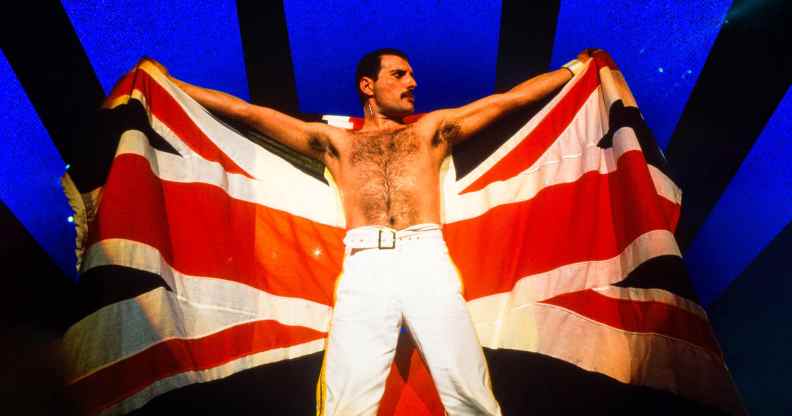
Freddie Mercury still serves as an inspiration to queer people. (Getty)
On the evening of 24 November 1991, Freddie Mercury died around 24 hours after he publicly confirmed he had AIDS.
Mercury was just 45 years old when he passed away, but he left a towering legacy that remains unmatched to this day. Over the course of his career, he redefined rock music for a new era – and he won an enormous legion of fans in the process.
It’s now 31 years since his death, but Mercury’s legacy lives on for queer artists and musicians. It wasn’t just his powerful voice that roped people in, it was the way he subverted gender and sexuality norms – and did it with endless sex appeal.
On the anniversary of Freddie Mercury’s death, PinkNews speaks to four artists and musicians about how he’s inspired them to be unabashedly themselves.
Harry Clayton-Wright, performance artist and theatre maker
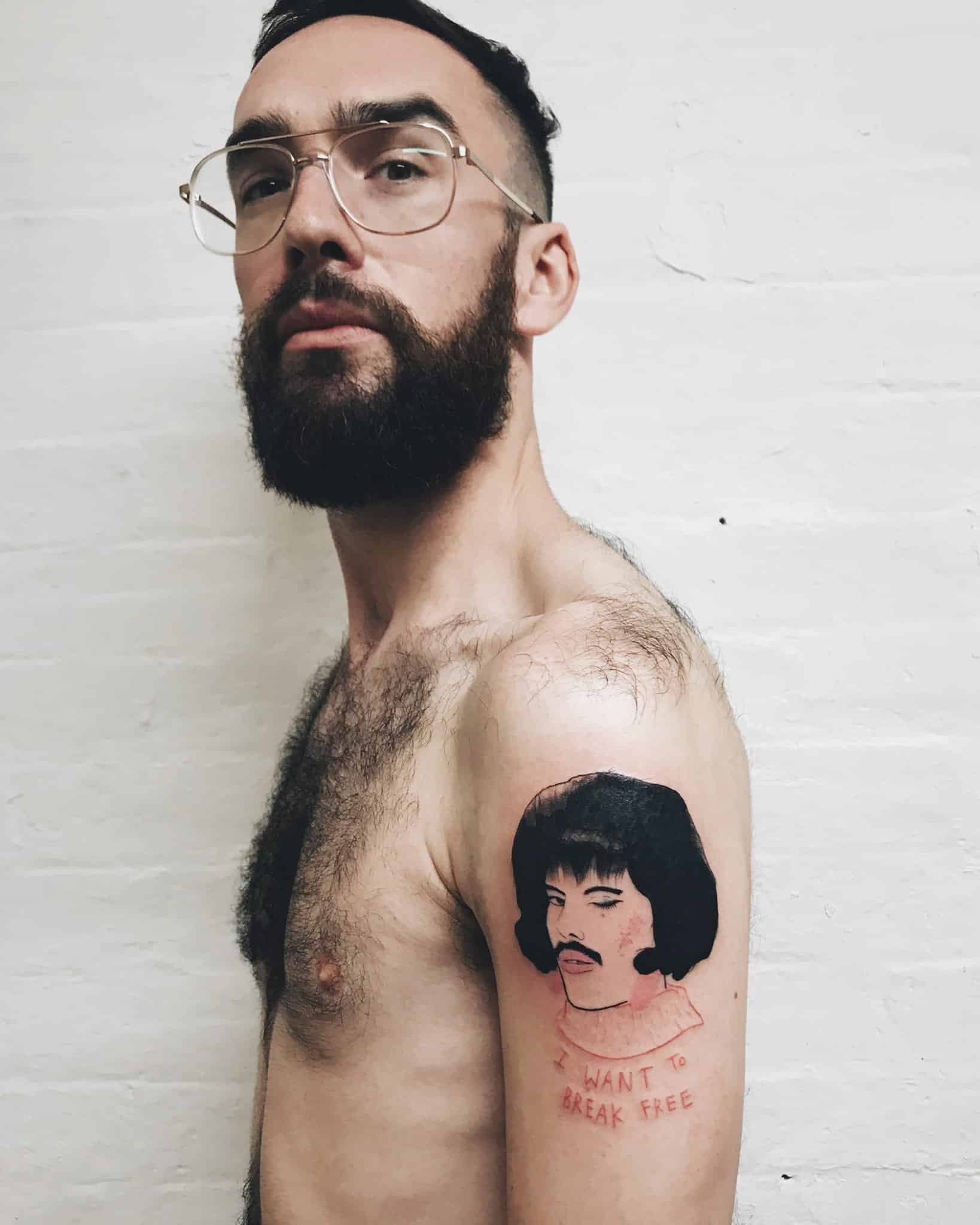
Harry Clayton-Wright showing his Freddie Mercury tattoo, inspired by the I Want To Break Free music video. The tattoo is by the tattoo artist _disinhibition. (Supplied)
Harry Clayton-Wright can’t remember a time when Queen and Freddie Mercury weren’t part of his life.
He was obsessed with Mercury even as a child, but it was as an adult that they started to channel Mercury’s artistry in their own work.
“I grew up with Queen’s music being played by my family in the car, their impact was and is still rightfully enormous and absolutely transcends,” Clayton-Wright tells PinkNews.
“That voice. That power. Those anthems. They’re incredible and undeniable. I was absolutely drawn to Freddie Mercury for as long as I can remember. That confidence was enthralling and I had (and still have) the biggest crush on him.”
As he started to build his own performance career, Clayton-Wright found themselves drawn to Mercury once more. He went on to develop a Freddie Mercury cabaret act inspired by “I Want To Break Free”, and he toured the world with it.
“I literally travelled with a vacuum cleaner in my suitcase and flew it to many different countries getting to play dress up as Freddie,” Clayton-Wright says.
Mercury’s role in Clayton-Wright’s life was so monumental that they got a tattoo of the singer.
“I love that I can look down and see him and he’s with me forever,” Clayton-Wright says.
Dead Method, a Welsh pop artist
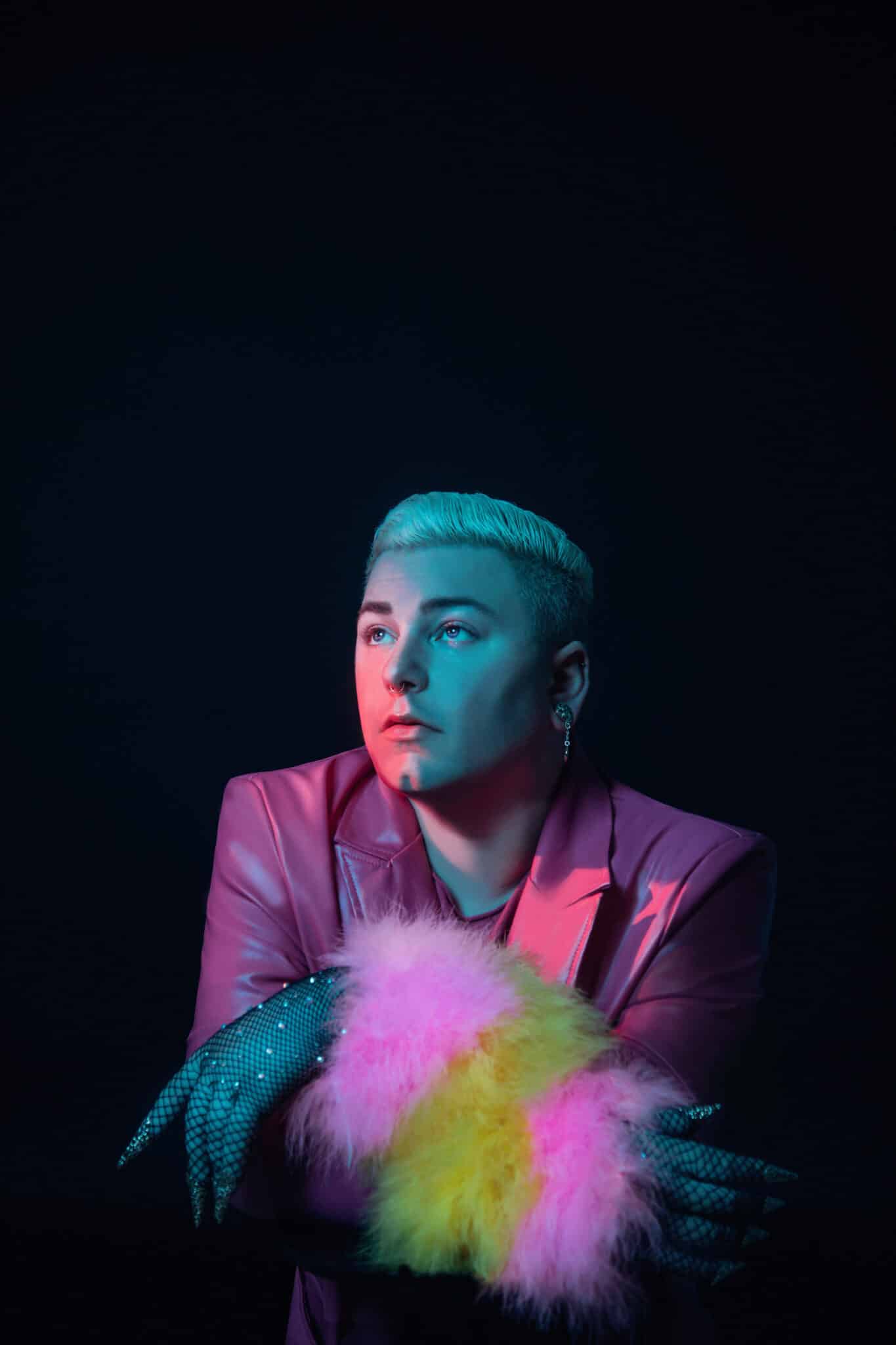
Dead Method says Mercury had a “profound impact on music and culture”. (Jonathan Daniel Pryce)
Dead Method grew up surrounded by the music of Freddie Mercury – and it left its mark.
“Growing up in a low-income house that loved music, Queen’s first Greatest Hits album was one of the few CDs in our collection and, as a result, it got a lot of play,” he tells PinkNews.
As he grew older and started to discover his own sexuality, Freddie Mercury served as an even bigger inspiration to Dead Method.
“As a queer musician trying to find my own voice, Freddie and artists just like him, who were unapologetic and fluid, made me realise that I was not alone and that there was space for me to inhabit in the industry without watering myself down.
“His impact cannot be understated as it gave me permission to be brave and to be free.”
Likely without even realising he was doing so, Freddie Mercury made it easier for future generations of queer artists to be open about who they are.
“The industry is slow to catch up but he at least proved that we are worthy of a seat at the table and that talent transcends social constructs and can touch the heart and soul of millions of different demographics and people, even those who at first show prejudice.”
He adds: “His legacy is untouchable. He had such a profound impact on music and culture that we are still talking about him today and we’ll still be talking about him in 20 years.”
Zee Machine, a queer singer-songwriter
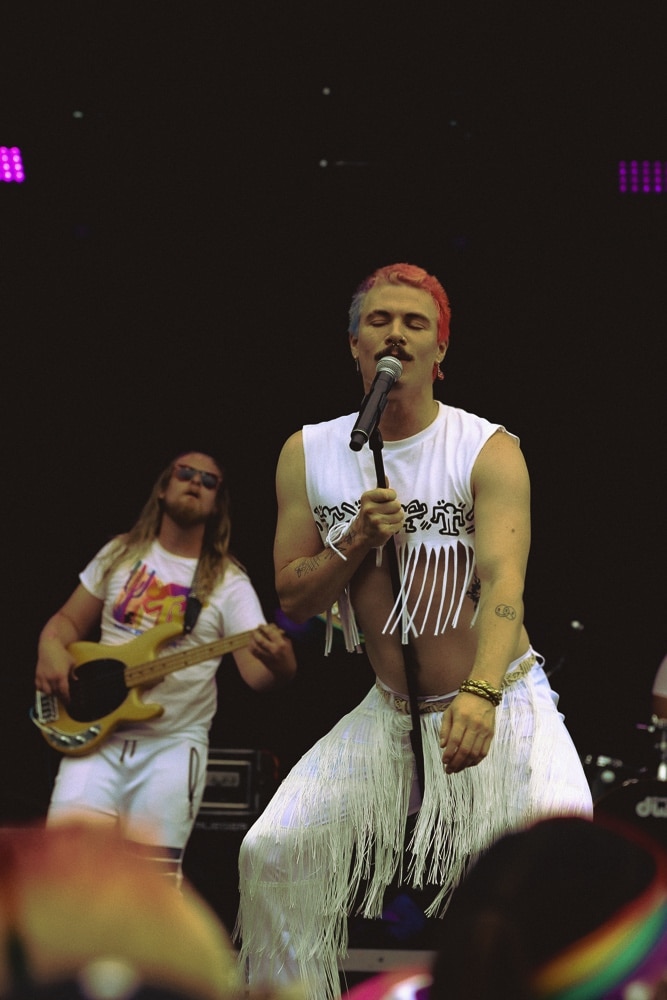
Zee Machine performing onstage at a Pride festival. (Supplied)
Zee Machine still remembers his first time hearing “Bohemian Rhapsody” – he recalls trying to make sense of what he was hearing.
“The tone and vocal prowess of Freddie’s voice transcended genre and gender. He was like nothing else and somehow he sounded like everything,” Zee Machine tells PinkNews.
They immediately became one of Queen’s many adoring fans, and it was ultimately Mercury who inspired them to pursue a career in music.
“Freddie is the blueprint for the modern-day frontman. He is still the standard for a rock singer. Hearing the sounds he could create and seeing the power that he exuded on stage – a stadium of hundreds of thousands at the command of his fingertips – had me awestruck and inspired from the moment I knew I wanted to make music.
“Freddie made me feel as though I could turn being a queer person, a provocateur, and a bombastic rock star into my superpower.”
When they look back at Mercury’s legacy today, they’re amazed society permitted him to be as subversive as he was.
“How incredible is it that the greatest rock singer of all time (a genre that is not historically the most queer-friendly) was a campy, flamboyant, moustachioed, leather-clad, spandex-wearing force of nature who fearlessly and unapologetically broke boundaries of gender presentation and sexual orientation in rock music of that era?”
Foxgluvv, a lesbian pop artist
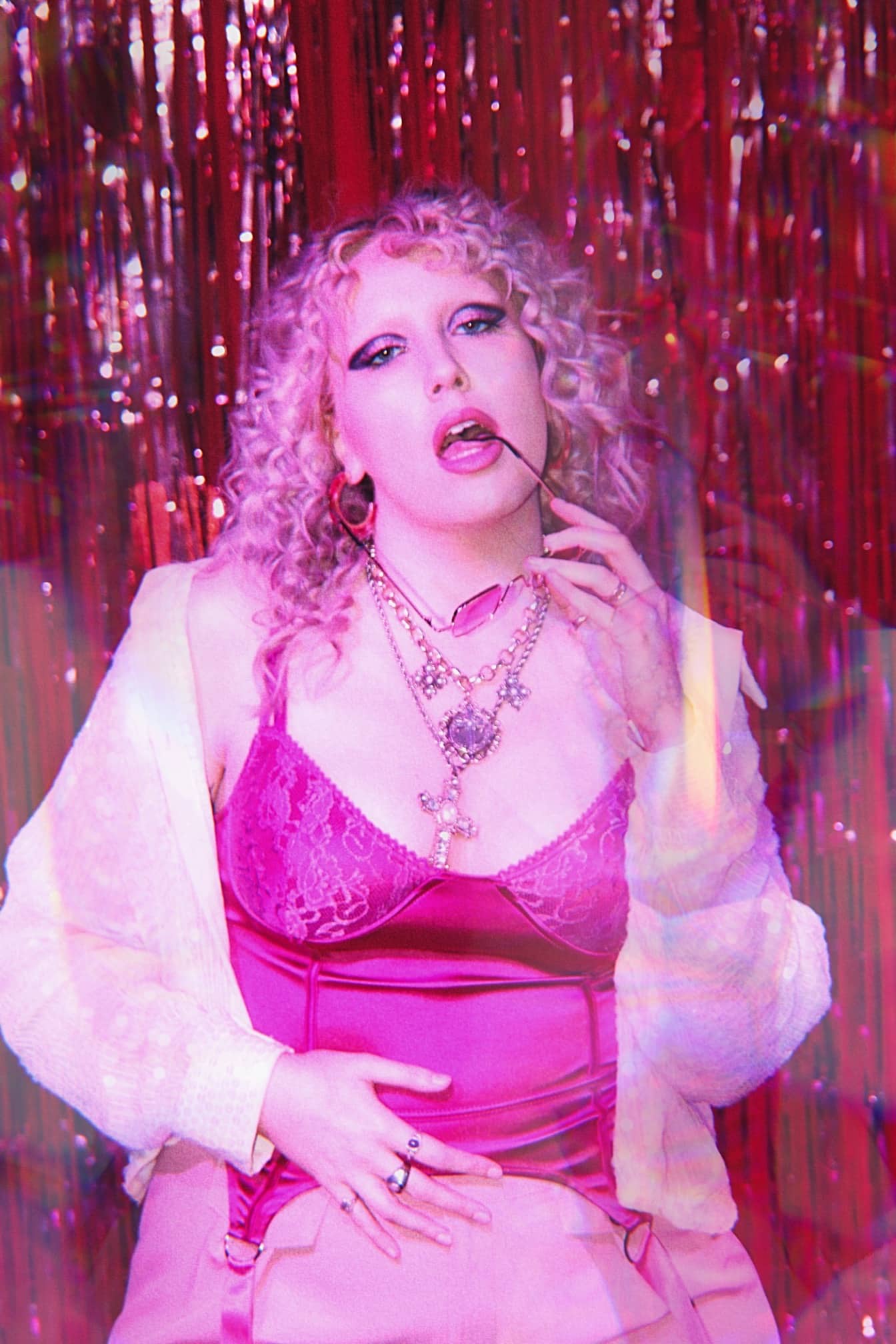
Foxgluvv says Mercury “helped create space for future queer artists”. (Supplied)
Queer DIY pop artist Foxgluvv still remembers her first time hearing “Killer Queen” when she was just a child.
“It felt so camp and extravagant,” she says. “Honestly that song is just everything to me.”
Over the years, Mercury’s music has had an enormous impact on Foxgluvv’s life and career. He remains a touchstone and a source of endless inspiration.
“I would say that Freddie is the first queer musician I really listened to and connected with… His voice made me feel proud before I even knew who I was.
“Every single time I see videos of Freddie performing it reignites the spark I have to be a performer and musician.
“I get literal goosebumps seeing him on stage being so unapologetically… him. If I am ever feeling stuck in writing, or if I need motivation to keep going as an artist – I put on Queen and I feel like my creativity and queerness are connected.”
Because Mercury was so shameless about his own sexual expression in his music, he helped create space for future queer artists, Foxgluvv says.
“What I, and so many others adore about him, is how every aspect of his identity was so visible. From his clothing and style, to how he carried himself on stage. He didn’t need to tick any boxes to be successful – he was that unique and talented,” they explain.
“When I think about Freddie’s legacy, I feel such a warmth within myself and I wish that I could thank him for making baby-dyke me feel so comfortable and not alone. He changed the lives of so many.”

